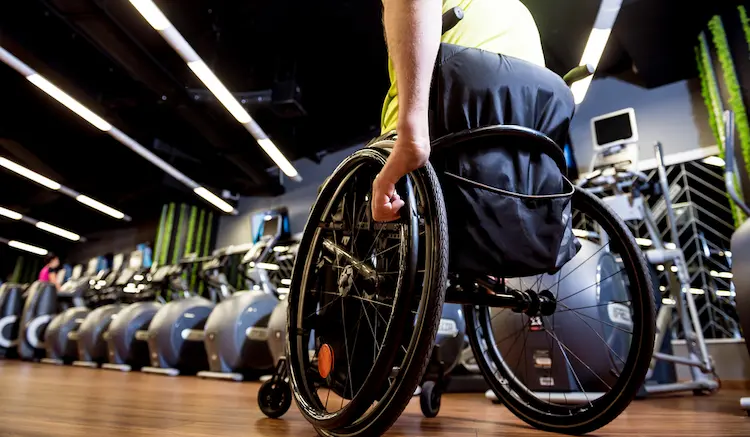Have you ever stopped to think about the power of the words we use daily? Take ‘handicapped’, for example. It’s a word many of us grew up hearing.
However, we have seen parking spaces designated for people with disabilities, sometimes referred to as “handicap parking spots.” In the same way, a “handicap stall” is a specially designed restroom stall for wheelchair users.
So, it’s no wonder that “handicap” has been socially tolerated for so long. But now, it’s at the center of a much-needed conversation about respect and understanding regarding disability.
Our article explores the changing attitudes towards disability terminology and why the phrase is now frequently deemed insulting. We will go into the background, the evolution of disability language, and the viewpoints of the disability community to explain the significance of using language that is both encouraging and respectful.
Explore the nuanced debate between Differently Abled vs Disabled.
Historical Context of ‘Handicapped’
The story of how the word “handicapped” has changed over time is very interesting.
Originally stemming from the phrase “hand in cap,” the term evolved over centuries. The term was also used in horse racing and other sports. By the 20th century, ‘handicapped’ became associated with disability without ill intent, often used in contexts like ‘handicapped parking’ or ‘handicapped accessible.’
However, as society’s understanding of disability rights and individual dignity grew, the word began to carry a weight of negativity, often associated with incapability or disadvantage, and so did the realization that the language we use to describe one another matters profoundly.
The term began to be seen as outdated and insulting, a legacy of a less informed era.
The Negative Connotations of ‘Handicapped’
The term ‘handicapped’ carries with it negative connotations that can be harmful.
It often implies a sense of limitation or incapacity, which is not reflective of the diverse abilities and experiences of people with disabilities. The outdated term fails to capture the resilience and capabilities of the disability community.
From Labels to People: The Shift in Disability Language
In recent years, the linguistic shift from ‘handicapped’ to ‘disabled person’ or ‘people with disabilities’ has marked a significant change in societal attitudes. To further explore the nuances between terms like ‘disabled person’ and ‘person with disabilities,’ read our detailed analysis in Disabled People or People with Disabilities: Which is it?
Such a transition is more than a superficial nod to political correctness; it represents a deeper, more respectful understanding of individuality and diversity.
Identity-first language and person-first language are at the forefront of change. It emphasises the person’s individuality rather than defining them by their disability.
For example, saying ‘person with a disability’ instead of ‘handicapped’ acknowledges the person’s humanity before their disability, fostering a more inclusive and respectful dialogue. So, the change in terminology is not just about altering words; it’s about transforming attitudes and perceptions, promoting a society that sees beyond disabilities to the person within.
Using language that puts the person first, we emphasize their identity beyond just their disability.
Perspectives from the Disability Community
Voices from the disability community have been instrumental in highlighting the offensiveness of the word ‘handicapped”.
Many say the term makes them feel bad and limits their identity to their disability, ignoring their other skills and gifts to society.
For example, a user, Ayshah B, shared on a forum that for her, the word ‘Handicapped ‘is quite old-fashioned with some negativity.
Another user, Josh Montgomery, shared that the word handicap was offensive. To him, it sounds like whoever is using it is trying to make it sound like being handicapped is a bad thing. For him, a disability is not bad; it’s just part of who you are.
To understand more about the range of conditions recognized as disabilities and their impact on individuals’ lives, explore our insights into the most commonly approved disabilities.
The Disability Rights Movement: A Catalyst for Change
The disability rights movement has been instrumental in change as well. Activists and advocates have tirelessly worked to shift public perception, advocating for language that respects the dignity and autonomy of individuals with disabilities.
Such a movement has been a driving force in redefining how society views and speaks about disability.
Many people in the disability community increasingly prefer neutral language or identity-first language, such as “autistic person” or “deaf person,” The approach acknowledges that for some, their disability is an integral part of their identity, not something to be skirted around or ignored in conversation.
Moving Beyond Outdated Terminology
As society progresses, so must our language. Disregarding words like “handicapped” isn’t an act of extreme sensitivity; rather, it’s a recognition and respect for the worth and variety of experiences shared by people with disabilities. Embracing more empowering language is a step towards a more inclusive society.
Current Preferred Terminology
In the quest for respectful communication, terms like ‘person with a disability’ and ‘differently abled’ have gained prominence. These phrases put the individual first, recognizing them beyond their disability.
Guidance from Leading Authorities
The American Psychiatric Association and other health authorities advocate for language that respects the dignity of individuals. They emphasize using terms that reflect the capabilities and strengths of people with disabilities, moving away from outdated and limiting descriptors.
The influence of organizations like Health and Human Services in shaping language around disability cannot be understated. Their guidelines and policies often set the tone for how disabilities are discussed and understood in broader society.
By advocating for more respectful and accurate language, these organizations play a crucial role in promoting mental health and well-being within the disability community. They help ensure that the language used in public discourse, healthcare, and policy is accurate but also empathetic and empowering.
Real Voices and Experiences
Hearing directly from disabled people offers invaluable insights. Whether it’s a deaf person sharing their experiences or an autistic person discussing identity, these narratives challenge stereotypes and highlight the diversity within the disability community.
Emily is 30 years old and uses a wheelchair. She has noticed that people around her are talking about herself differently. They now call her a “person with a disability” instead of “handicapped.” Rules on diversity and inclusion emphasize the need to adopt polite terms, which is part of a more significant cultural shift in the workplace.
The Impact of Words on Lives
For many, the shift in language is not just about terminology; it’s about changing perceptions and experiences. From overcoming societal barriers to celebrating achievements, the stories of people with disabilities underscore the power of words in shaping lives.
In the above video, Emma lists suitable words for people with disabilities. The main video begins at 2:55.
The ADA National Network has detailed rules for people who want to learn more about using words when talking about or mentioning people with disabilities.
Addressing Common Questions
Why have we moved away from ‘handicapped’?
Yes, it’s a shift towards respect and equality. The term, with its negative connotations, no longer aligns with the progressive understanding of disability as a part of human diversity.
The change is not due to a specific law or regulation passed by a single entity. Instead, it’s a change that has evolved due to the efforts of disability rights advocates, organizations, and the broader community.
Is it politically correct to say ‘handicapped’?
The short answer is no. Most people now generally consider the term to be outdated and insensitive. The language we use should reflect our respect for the dignity and autonomy of every individual, regardless of their abilities.
What is the polite way to say handicapped?
Terms like ‘person with a disability’ or ‘disabled person’ are terms disabled people prefer. They reflect a more accurate and respectful approach to individual identity.
What is the appropriate term for describing someone with a cognitive disability?
If you need to characterize someone’s cognitive disability, use “person with an intellectual disability
For a whirlwind tour through the legal landscape, including the ins and outs of the Disabilities Act, don’t miss our comprehensive guide on the rights of disabled persons.
Journey of Learning
Understanding the proper terminology is an ongoing process. It involves listening to the disability community, staying informed about preferred terms, and being open to change. The journey is crucial to building a more inclusive and respectful society.
A snippet of the video shows negative and positive words to be used for people with disabilities.
Conclusion
As we conclude our exploration of why the term ‘handicapped’ is considered offensive, it’s clear that language is a powerful tool in shaping societal attitudes and perceptions. The evolution from ‘handicapped’ to more empowering terms like ‘person with a disability’ or ‘differently abled’ reflects a broader shift towards recognizing and respecting the diversity and capabilities of individuals with disabilities.
We‘ve come a long way from where we started in the 20th and early 21st centuries, but we still have a long way to go.
Our journey is not just about altering vocabulary; it’s about transforming mindsets and fostering a culture of respect and inclusion. By choosing our words thoughtfully, we contribute to a society that values all its members equally, regardless of their abilities.
Let’s continue to listen, learn, and adapt our language to ensure it uplifts and empowers, paving the way for a more understanding and inclusive world.

